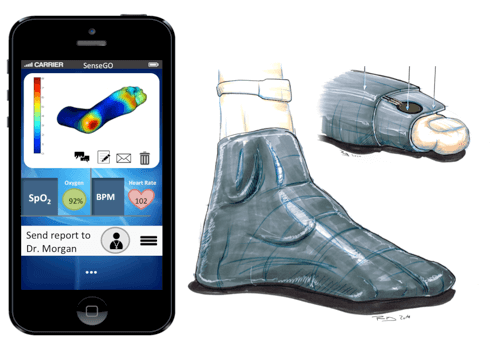The development is intended to help patients with diabetic neuropathy, which is caused by nerve damage as a result of anatomical deformation, excessive pressure or poor blood supply. The disease blurs the feeling in the feet and the patients do not feel pain or pressure which can lead to leg ulcers, pressure sores and even amputation.

Students from the Hebrew University have developed socks that contain pressure sensors and by connecting them to an application (application) on the mobile phone, they warn against pressure that may cause foot ulcers among diabetics.
The development is intended to help patients with diabetic neuropathy, which is caused by nerve damage as a result of anatomical deformation, excessive pressure or poor blood supply. The disease blurs the feeling in the feet and the patients do not feel pain or pressure which can lead to leg ulcers, pressure sores and even amputation.
More than 130 million people worldwide suffer from diabetic neuropathy, and it is a leading cause of limb amputation.
Diabetics undergo routine tests to monitor the increased pressure in the legs and to detect ulcers. Since the ulcers are diagnosed only after they develop, a recovery time is required which significantly increases the suffering of the patients and the costs of treatment and recovery.
"This is a significant medical problem that affects the lives of millions. We thought that there must be a way to completely prevent these wounds," says Danny Babli, the chief engineer of Biodesign, the medical innovation program shared with the Hebrew University of Jerusalem and the Hadassah Medical Center.
To face the challenge, Babli teamed up with Sagia Friedman from the Peter Broida Center for Innovation in Engineering and Computer Science at the Hebrew University and Dr. David Morgenstern, an expert in orthopedic surgery from the Hadassah Medical Center. Together with members of the Biodesign group from the Hebrew University, they developed SenseGo, a sock that contains dozens of pressure sensors hidden in the fabric of the sock. The sock detects pressure created by incorrect posture, anatomical deformity or inappropriate shoes, and it sends signals that appear in a smartphone application warning of the risk of ulceration. The sock is suitable for cleaning in a washing machine.
"Following the sharp jump in healthcare spending over the last decade, the need for affordable healthcare services is increasing. Medical innovation plays a vital role in making medicine efficient and at the same time economically accessible and necessary to improve treatment and improve its results. By creating the tools to prevent the development of ulcers for patients and their families, we can dramatically reduce the healthcare costs associated with diabetes," says Prof. Jacob Nachmias, director of the Biodesign program.
The development of SenseGO joins a market that is estimated at about 1.3 billion dollars in the US alone.
Bio-Design is an entrepreneurial program to accelerate medical innovation with a multidisciplinary approach, based on teamwork. The program takes expert doctors and outstanding students for a doctorate in bioengineering and a master's degree in business administration and guides them on how to bring medical innovation to the market. The teams receive a list of clinical needs from medical centers in Israel and abroad and evaluate their commercial potential. When students identify a clinical need with commercial potential, they develop an engineering solution that can be protected through patent registration. The program is managed by Prof. Nachmias, head of the Center for Bioengineering at the Hebrew University and Prof. Haim Lotan, director of the heart unit at the Hadassah Medical Center.
The inventions created in the biodesign program are protected by patents and are commercialized by Application, the technology commercialization company of the Hebrew University, and by Hadassit, the knowledge commercialization company of Hadassah Hospital.
Link to the video about the development of the SenseGO:

3 תגובות
Hello, I would like to know the price of the socks developed at the Hebrew University and what the success rate is. There are not enough responses, thank you
Peace
Urgent….please contact Rumi
Thanks
"Smart socks".
The university could be expected to know that Garev is male.